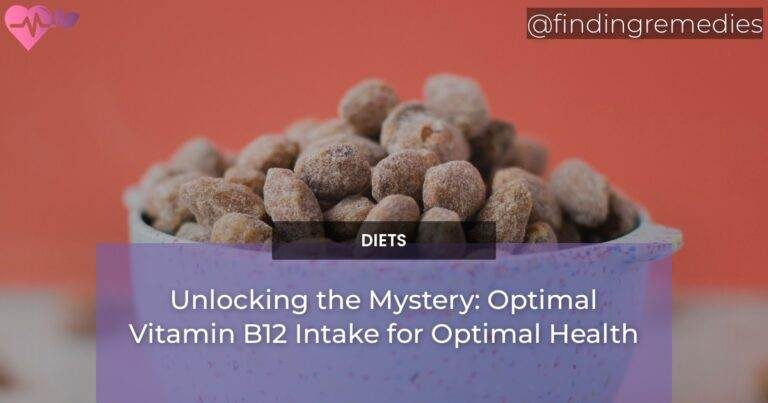Vitamin B12: How Much Do You Need?
Vitamin B12 is a crucial nutrient for our body. It has a significant role in the proper functioning of the brain and nervous system, as well as in the formation of red blood cells. Our body cannot produce vitamin B12, which means we need to get it from the food we eat or supplements we take. In this article, we will look at the recommended daily intake, food sources, vegan sources, fortified foods, symptoms of deficiency, and testing and treatment options for vitamin B12.
Recommended Daily Intake
The recommended daily intake of vitamin B12 varies by age and gender. According to the National Institutes of Health (NIH), the daily intake for adults is 2.4 micrograms per day. Pregnant and breastfeeding women require slightly more, at 2.6 and 2.8 micrograms per day, respectively. Children require smaller amounts, ranging from 0.4 to 1.8 micrograms per day, depending on age.
It is important to note that the recommended daily intake may need to be higher for individuals who have a vitamin B12 deficiency or who have trouble absorbing the vitamin. In such cases, a doctor may recommend higher doses of vitamin B12 supplements.
Vitamin B12 Sources
Vitamin B12 is found naturally in animal products such as meat, fish, and dairy products. Some of the best food sources of vitamin B12 include:
- Beef liver and other organ meats
- Clams, oysters, and other shellfish
- Tuna, salmon, and other fish
- Cheese, milk, and other dairy products
- Eggs and egg yolks
In addition to these food sources, some breakfast cereals, nutritional yeast, and plant-based milk alternatives may be fortified with vitamin B12.
It is important to note that vitamin B12 is not found in plant-based foods, which means that individuals following a vegan or vegetarian diet may have trouble getting enough of this nutrient.
Vegan Sources of Vitamin B12
For vegans and vegetarians, it is important to find alternative sources of vitamin B12. Some vegan-friendly sources of vitamin B12 include:
- Vitamin B12-fortified breakfast cereals
- Nutritional yeast
- Vitamin B12-fortified plant-based milk alternatives, such as soy or almond milk
- Vitamin B12 supplements
While these sources can help vegans and vegetarians meet their vitamin B12 requirements, it is important to note that the absorption rate of vitamin B12 from these sources may be lower than from animal-based sources.
Fortified Foods
Fortified foods are foods to which nutrients have been added to increase their nutritional value. Some foods that are commonly fortified with vitamin B12 include:
- Breakfast cereals
- Nutritional yeast
- Plant-based milk alternatives
- Meat substitutes, such as veggie burgers
While fortified foods can provide a source of vitamin B12, it is important to read labels carefully to ensure that the food contains an adequate amount of vitamin B12. Additionally, fortified foods should not be relied upon as the sole source of vitamin B12.
Symptoms of Vitamin B12 Deficiency
Vitamin B12 deficiency can have serious consequences on our health. Some of the symptoms of vitamin B12 deficiency include:
- Fatigue and weakness
- Pale skin
- Shortness of breath
- Dizziness
- Numbness and tingling in the hands and feet
- Depression, memory loss, and other cognitive problems
- Impaired vision
- Mouth ulcers
- Difficulty walking and balance problems
If left untreated, vitamin B12 deficiency can cause irreversible damage to the nervous system and lead to anemia.
Testing and Treatment
If you suspect that you have a vitamin B12 deficiency, it is important to speak with your doctor. Your doctor can perform a blood test to determine your vitamin B12 levels and recommend a course of treatment if necessary. Treatment for vitamin B12 deficiency typically involves vitamin B12 supplements, either in the form of injections or oral supplements.
Vitamin B12 supplements are generally safe, but it is important to follow the recommended dosage and speak with your doctor if you have any concerns. Additionally, while supplements can help prevent vitamin B12 deficiency, it is important to focus on getting adequate amounts of vitamin B12 from food sources whenever possible.
Conclusion
By understanding the recommended daily intake of vitamin B12, food sources of vitamin B12, vegan sources of vitamin B12, fortified foods, symptoms of vitamin B12 deficiency, and testing and treatment options, you can ensure that you are getting enough vitamin B12 in your diet. Additionally, understanding the symptoms and consequences of vitamin B12 deficiency can help you identify any potential deficiencies and seek proper treatment.

